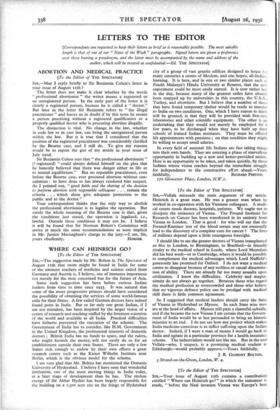WHERE CAN HEINRICH GO ?
[To the Editor of THE SPECTATOR] SIR,—The suggestion made by Mr. Bolton in The Spectator of August 12th that room might be found in India for some of the eminent teachers of medicine and science exiled from Germany and Austria is, I believe, one of immense importance not merely for the men concerned but for the future of Asia.
Some such suggestion has been before various Indian leaders from time to time since 1933. It was natural that some of the more progressive princes should have considered the possibility of obtaining the services of some world-famous exile for their States. A few exiled German doctors have indeed found posts in India. But so far only one great Indian, if I am not mistaken, has been inspired by the larger vision of a centre of research and teaching staffed by the foremost scientists of the world and available to all India. Practical difficulties have hitherto prevented the execution of the scheme. The Government of India has to consider, like H.M. Government in the United Kingdom, the professional interests of domestic doctors ; British India has no funds to spare, and the rulers, who might furnish the money, will not easily do so for an establishment outside their own States. There are only a few States rich enough to endow by their own efforts a great research centre such as the Kaiser Wilhelm Institute near Berlin, which is the obvious model for the scheme.
I am very glad that Mr. Bolton has mentioned the Osmania University of Hyderabad. I believe I have seen that wonderful institution, one of the most moving things in India today, at a later stage of development than he has. The tireless energy of Sir Akbar Hydari has been largely responsible for the building on a 1,500 acre site on the fringe of Hyderabad
city of a group of vast granite edifices designed to house for many centuries a centre of Moslem, and one hopes, all-Indian, learning. It is here, and in one or two similar places such a, Pandit Malanya's Hindu University at Benares, that the new experiment could be most easily started. It is now rather late in the day, because many of the greatest exiles have already been snapped up by universities in this country, the U.S.A., Turkey, and elsewhere. But I believe that a number of those that have found temporary shelter would be ready to transfer to India on two conditions. One, which I have reason to think will be granted, is that they will be provided with first-rate laboratories and other scientific equipment. The other is an undertaking that they would not merely be employed for a few years, to be discharged when they have built up their schools of trained Indian assistants. They must be offered life appointments with pensions ; on that condition they might be willing to accept small salaries.
In every field of national life Indians are fast taking things into their own hands. They are entering a phase of marvellous opportunity in building up a new and better-provided nation. Here is an opportunity to be taken, and taken quickly, by those Indians whose vision reaches beyond the immediate struggle for independence to the constructive effort ahead.—Yours
faithfully, RICHARD FREUND. 170 Gloucester Place, London, N.W.i.


































 Previous page
Previous page